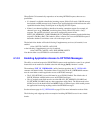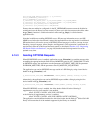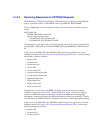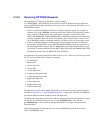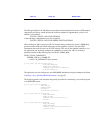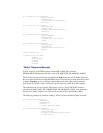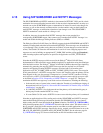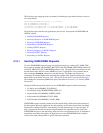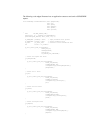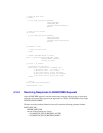
The Dialogic
®
Global Call API library ensures that the Allow header field contains all SIP methods
supported by the library, which includes the following methods if supplementary services (call
transfer) is not enabled:
INVITE, CANCEL, ACK, BYE, OPTIONS
or the following if supplementary services is enabled:
INVITE, CANCEL, ACK, BYE, REFER, NOTIFY, OPTIONS
When sending an “OK” response, the IP Call Control library automatically inserts a MIME body
part that contains SDP data which reflects the current capability set (that is, the same SDP
information that would be sent in an INVITE request). This may be the standard capability set, or
the application may explicitly configure the capabilities to send in the “OK” by inserting a
parameter element of the following type into the GC_PARM_BLK:
GCSET_CHAN_CAPABILITY
IPPARM_LOCAL_CAPABILITY
• value = IP_CAPABILITY data structure
gc_util_insert_parm_ref-ex(&target_datap,
GCSET_CHAN_CAPABILITY,
IPPARM_LOCAL_CAPABILITY,
(unsigned long)(sizeof(IP_CAPABILITY)),
&a_DefaultCapability);
The application can also send generic, non-SDP MIME information using the techniques described
in Section 4.10.4, “Sending MIME Information”, on page 197.
The following pseudo-code illustrates the general procedure for constructing a successful response
to an OPTIONS request.
gc_util_insert_parm_val(&parmblkp,
IPSET_MSG_SIP,
IPPARM_MSGTYPE,
sizeof(int),
IP_MSGTYPE_SIP_OPTIONS_OK);
gc_util_insert_parm_ref_ex(&parmblkp,
IPSET_SIP_MSGINFO,
IPPARM_SIP_HDR,
(unsigned long)(strlen(szAccept)+1),
szAccept);
gc_util_insert_parm_ref_ex(&parmblkp,
IPSET_SIP_MSGINFO,
IPPARM_CALLID_HDR,
(unsigned long)(strlen(g_CurrentCallID)+1,
g_CurrentCallID);
parm_ID value_buf Default value



